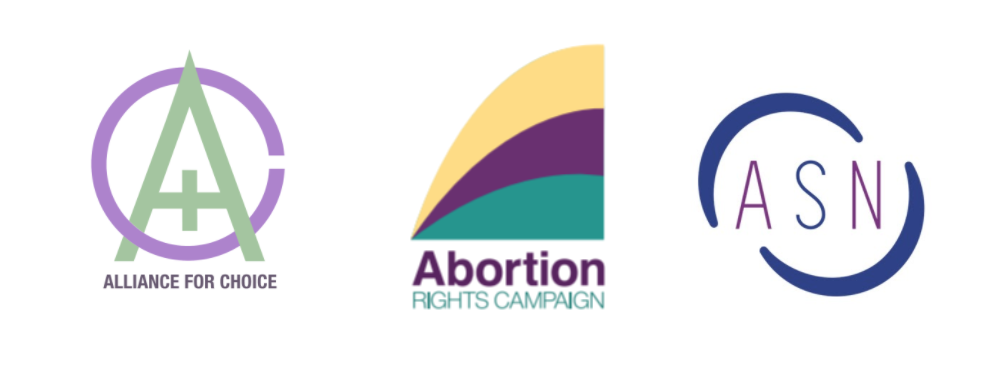
Data released today by the UK government shows that during 2020, 565 people gave addresses from Ireland, North and South, when having an abortion in England or Wales. 371 travelled for abortion from Northern Ireland and 194 from the Republic – in a year when public health guidance was to stay close to home. Abortions for those resident in Ireland under ‘Ground E’, which permits abortion in the case of fetal abnormality, made up 32% of abortions, an increase from 17%. This shows that the current stringent law is forcing people to travel after receiving a complex diagnosis instead of providing care at home.
“Bearing in mind that the majority of the year was dominated by the Covid-19 pandemic, this means that hundreds of people had to travel between Ireland and Britain when both islands were under lockdowns,” said spokesperson for the Abortion Rights Campaign Ms JoAnne Neary. “Despite abortion having been legalised in the Republic since January 2019, and decriminalised in Northern Ireland since October 2019, there clearly remain grossly unacceptable gaps in the service provision on this island.”
“We are aware that people are still travelling because of the mandatory three day wait, because of the strict 12 week limit on care, because of a complete lack of local services in several areas and many other barriers to abortion care. The authorities both North and South need to start respecting the human rights of women and pregnant people on this island. The promises of the Repeal referendum are not being lived up to.”
Behind every statistic there are real people who faced huge difficulties in accessing abortion during a pandemic. Each trip represented additional risks of exposure to COVID-19 for those accessing abortion abroad as they used transport, passed through airports and navigated accommodation – a risk they should never have been exposed to. Furthermore, the need to justify travel as ‘essential’ to border authorities represents an absolute breach of the right to privacy. “Ireland has been repeatedly criticised on the international stage for failing to meet its human rights obligation, and this is yet another example of that,” said Ms Neary. “The State made extensive changes to how we live during the pandemic, from employment and education to health and justice. The confirmation of telemedicine consultations for early medical abortion was welcome and absolutely necessary. However, the State continued to force people to travel from this island during the pandemic by its restrictive abortion legislation, with very real impacts and risks to people’s privacy and health.”
Mara Clarke of the Abortion Support Network shared that “During the pandemic, we have helped people in all kinds of circumstances to travel to England for abortions. Some had abortions in Ireland which failed, pushing them past the 12-week limit. Others received a catastrophic foetal anomaly diagnosis, but two clinicians didn’t agree the issue was bad enough to have an abortion in Ireland. Travelling for abortion during a pandemic meant dealing with limited flights, closed hotels, mandatory and expensive PCR tests and huge uncertainty.
Ms Clarke continued “On top of this, we know that there are people absent from these numbers. Before provision began, we estimated that 600-800 people per year would fall outside of legal provision. 375 travelled in 2019 and 194 in 2020. We know there are women that are missing.”
The Abortion Rights Campaign and Alliance for Choice call on the government in the Republic to use this year’s Review process to break down the barriers to accessing abortion at home. We call on the Northern Ireland Executive to immediately commission abortion services that meets best practice in all Health Trusts. Unlike elsewhere on these islands Northern Ireland has no access to telemedicine, this must be urgently reviewed.
Danielle Roberts, Alliance for Choice Belfast explained “Despite abortion being decriminalised in Northern Ireland in late 2019, the Health Minister has allowed the Executive to block the commission of services. This means that we have only a few conscientious providers accross the province providing care under interim guidance, which provides for early medical abortion up to 10 weeks. This falls well short of the regulations and law.”
Ms Roberts continued, “Westminster’s NI Office maintains that travel for funded care in England sufficiently meets their human rights obligations – yet this is patently untrue. The United Nations found that compelled travel for abortion is a systematic violation of human rights. No one should have to travel for an abortion, especially not during a pandemic. We are aware of people whose only option at the height of the Covid-19 restrictions was an 8 hour freight ferry to England and back. While we know around 1000 women and pregnant people have been able to access care in NI since the law changed, these statistics show many are still travelling and does not account for the 28% rise in use of services such as Women on Web for those whose needs cannot be met by their own Health Service. We urgently need commissioned abortion services to deliver our compehensive abortion provision as on paper instead of relying on the goodwill of healthcare professionals, as well as the introduction of Safe Access Zones.
Ms Neary concluded that “Until we have free, safe, legal and local abortion everywhere, complete decriminalisation and removal of restrictions, we will continue to see people forced to travel year after year. We look forward to the day when we don’t have to make an annual statement on the UK statistics, condemning the inevitable results of failure to provide care at home.”
The UK Department of Health Statistics are published here: https://www.gov.uk/government/statistics/abortion-statistics-for-england-and-wales-2020

